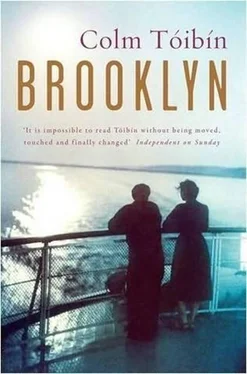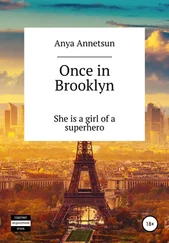When she came back from receiving communion, Eilis tried to pray and found herself actually answering the question that she was about to ask in her prayers. The answer was that there was no answer, that nothing she could do would be right. She pictured Tony and Jim opposite each other, or meeting each other, each of them smiling, warm, friendly, easygoing, Jim less eager than Tony, less funny, less curious, but more self-contained and more sure of his own place in the world. And she thought of her mother now beside her in the church, the devastation and shock of Rose's death having been softened somewhat by Eilis's return. And she saw all three of them-Tony, Jim, her mother-as figures whom she could only damage, as innocent people surrounded by light and clarity, and circling around them was herself, dark, uncertain.
She would have done anything then, as Nancy and George walked down the aisle together, to join the side of sweetness, certainty and innocence, knowing she could begin her life without feeling that she had done something foolish and hurtful. No matter what she decided, she thought, there would not be a way to avoid the consequences of what she had done, or what she might do now. It occurred to her, as she walked down the aisle with Jim and her mother and joined the well-wishers outside the church, where the weather had brightened, that she was sure that she did not love Tony now. He seemed part of a dream from which she had woken with considerable force some time before, and in this waking time his presence, once so solid, lacked any substance or form; it was merely a shadow at the edge of every moment of the day and night.
As they posed for photographs outside the cathedral, the sun came out fully and many onlookers came to view the bride and bridegroom getting ready to travel to Wexford in a large hired car decorated with ribbons.
At the wedding breakfast, Eilis spoke to Jim Farrell on one side and on the other a brother of George's who had come home from England for the wedding. She was watched fondly and carefully by her mother. It struck her as almost funny that every time her mother put a morsel of food into her mouth she looked over to check that Eilis was still there and Jim Farrell firmly to her right and that they seemed to be having an agreeable time. George Sheridan's mother, she saw, looked like an elderly duchess who had been left with nothing except a large hat, some old jewellery and her immense dignity.
Later, after the speeches, when photographs were being taken of the bride and bridegroom, and then the bride with her family and the bridegroom with his, Eilis's mother sought her out and whispered to her that she had found a lift to Enniscorthy for herself and the two O'Brien girls. Her mother's tone was nearly too pleased and conspiratorial. Eilis realized that Jim Farrell would believe that her mother had engineered this and she realized also that there was nothing she could do to let him know that she had not been involved. As she and Jim were watching the car going off, and cheering the newly married couple, they were approached by Nancy 's mother, who was in a state of happiness, aided, Eilis thought, by many glasses of sherry and some wine and champagne.
"So, Jim," she said, "I'm not the only one who says that the next outing we'll all have will be your big day. Nancy will have plenty of advice to give you when she comes home, Eilis."
She began to laugh in a cackling way that Eilis thought was unseemly. Eilis looked around to make sure that no one was paying them any attention. Jim Farrell, she saw, was staring coldly at Mrs. Byrne.
"Little did we think," Mrs. Byrne went on, "that we'd have Nancy in Sheridan 's, and I hear the Farrells are moving out to Glenbrien, Eilis."
The expression on Mrs. Byrne's face was one of sweet insinuation; Eilis wondered if she might make an excuse and simply run towards the ladies' so that she would not have to listen to her any more. But then, she thought, she would be leaving Jim on his own with her.
"Jim and I promised my mother we'd make sure she knows where the car is," Eilis said quickly, pulling Jim by the sleeve of his jacket towards her.
"Oh, Jim and I!" exclaimed Mrs. Byrne, who sounded like a woman from the outskirts of the town making her way home on a Saturday night. "Do you hear her? Jim and I! Oh, it won't be long now and we'll all have a great day out and your mother'll be delighted, Eilis. When she came down with the wedding present the other day she told us she'd be delighted and why wouldn't she be delighted?"
"We have to go, Mrs. Byrne," Eilis said. "Can you excuse us?"
As they walked away Eilis turned towards Jim and narrowed her eyes and shook her head. "Imagine having her as a mother-inlaw!" she said.
It was, she thought, merely a small act of disloyalty, but it would prevent Jim from thinking that she had anything to do with Mrs. Byrne in her present state.
Jim managed a wintry smile. "Can we go?" he asked.
"Yes," she said, "my mother knows exactly where the lift to Enniscorthy is. There is no need for us to stay here any longer." She tried to sound imperious and in control.
They drove out of the car park of the Talbot Hotel and along the quays and then crossed the bridge. Eilis decided that she would put no further thought into what her mother might have said to Mrs. Byrne or, indeed, what Mrs. Byrne herself had said. And if Jim wanted to, and if it helped to explain his silence and the rigid set of his jaw, then he could do so all he pleased. She was determined not to speak until he did and not to do anything to distract him or cheer him up.
As they turned towards Curracloe, he finally spoke. "My mother asked me to let you know that the golf club is going to inaugurate a prize in memory of Rose. It will be given by the lady captain as a special trophy on Lady Captain's Day for the best score by a lady newcomer to the club. Rose, she says, was always really nice to people who were new to the town."
"Yes," Eilis said, "she was always good with new people, that's true."
"Well, they're having a reception to announce the prize next week and my mother thought that you could come to tea with us and then we'd go out to the golf club for the reception."
"That would be very nice," Eilis said. She was about to say that her mother would be pleased when she told her the news but she thought that they had heard enough about her mother for one day.
He parked the car and they walked down towards the strand. Although it was still warm, there was a strong haze, almost a mist, over the sea. They began to walk north towards Ballyconnigar. She felt relaxed with Jim now that they were away from the wedding and happy that he had not mentioned what Mrs. Byrne had said and did not seem to be thinking about it.
Once they had passed Ballyvaloo, they found a place in the dunes where they could sit comfortably. Jim sat down first and then made space for her so that she was resting against him with her back to him. He put his arms around her.
There was no one else on the strand. They looked at the waves crashing gently on the soft sand, remaining for some time without speaking.
"Did you enjoy the wedding?" he asked eventually.
"Yes, I did," she replied.
"So did I," he said. "It's always funny for me seeing everyone's brothers and sisters because I'm an only child. I think it must have been hard for you losing your sister. Today, watching George with his brothers and Nancy with her sisters made me feel strange."
"Was it difficult being an only child?"
"It matters more now, I think," Jim said, "when my parents are getting older and there's just me. But maybe it mattered in other ways. I was never really good at getting on with people. I could talk to customers in the pub and all that, I knew how to do that. But I mean friends. I was never good at making friends. I always felt that people didn't like me, or didn't know what to make of me."
Читать дальше












